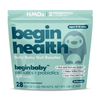What to Look for in an Infant Formula
share this article

Choosing the right infant formula can be overwhelming, given the wide variety of options on the market. Whether you're supplementing breastfeeding or exclusively formula-feeding, selecting a formula that meets your baby’s nutritional needs is crucial for their growth and development. Here’s what you should look for in an infant formula to ensure your baby gets the best start in life.
Meets FDA Standards
Ensure the formula complies with FDA regulations, which mandate strict guidelines for the nutritional content of infant formulas in the United States. This guarantees that the product provides essential nutrients like protein, fat, vitamins, and minerals needed for a baby’s healthy development.
Nutritional Content
Infant formulas should mimic the nutritional composition of breast milk as closely as possible. Look for these key nutrients:
- DHA and ARA: These omega-3 and omega-6 fatty acids are crucial for brain and eye development.
- Human Milk Oligosaccharides (HMOs): These prebiotics found in breast milk promote gut health and immune function (Plaza-Díaz et al., 2019).
Begin Health Expert Tip
Find out why this Nutrition Scientist recommends HMOs for babies.
Protein Source
Formulas are typically made from one of the following protein bases:
- Cow’s Milk-Based: Most formulas are derived from cow’s milk and modified to suit infants.
- Soy-Based: A plant-based option for babies with lactose intolerance or milk allergies, though it's less common for infants to need soy.
- Hydrolyzed or Hypoallergenic: Designed for babies with milk protein allergies, these formulas break down proteins into smaller, easier-to-digest components (Osborn & Sinn, 2006).
Digestibility
Look for formulas that are easy on your baby’s digestive system. Options with added probiotics and prebiotics can support a healthy gut microbiome, reducing issues like constipation and colic.
Here are the top ingredients to avoid in baby prebiotics and probiotics.
Avoid Harmful Additives
Avoid formulas with unnecessary additives like artificial sweeteners, flavors, or high levels of corn syrup solids. Look for options that are organic or minimally processed to reduce exposure to potential toxins.
This dietitian reveals the top ingredients to avoid in baby formula.
Specialized Formulas for Unique Needs
Some infants may require specialized formulas:
- Lactose-Free Formulas: For babies with lactose intolerance.
- Premature Infant Formulas: Contain extra calories and nutrients to support preemies’ rapid growth.
- Anti-Reflux Formulas: Thicker formulas designed to reduce spit-up and reflux symptoms.
Conclusion
The best infant formula is one that meets your baby’s specific nutritional and digestive needs. Look for options that contain HMOs to mimic the benefits of breast milk and prioritize ingredients that support gut health.
Summary
When choosing an infant formula, prioritize options that meet FDA standard and contain ingredients that mimic the nutrients in breast milk, and support digestion such as HMOs and probiotics.
Always consult your pediatrician before choosing or switching formulas to ensure it’s the right choice for your baby’s health.




















